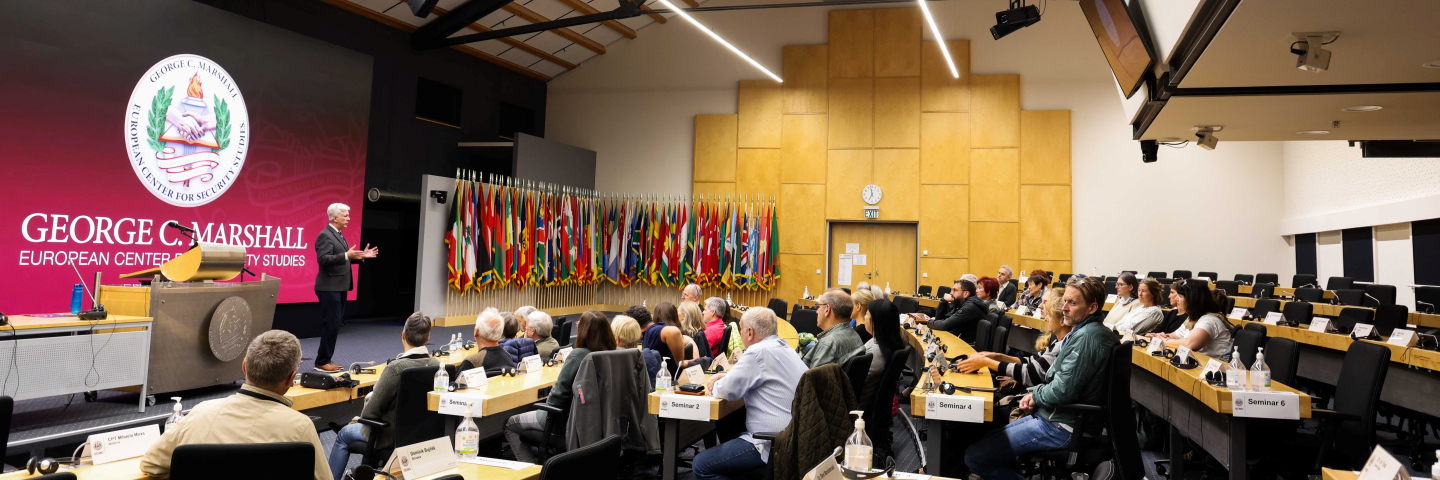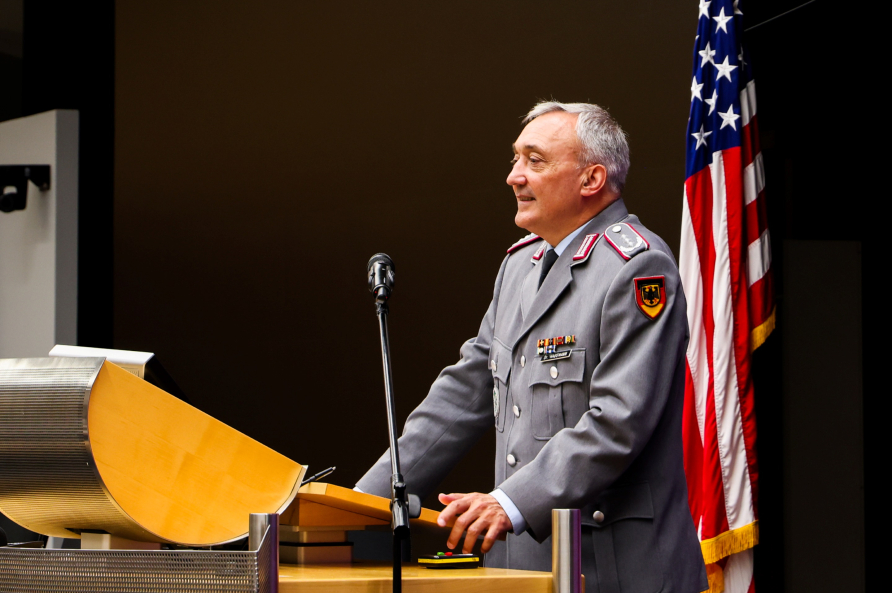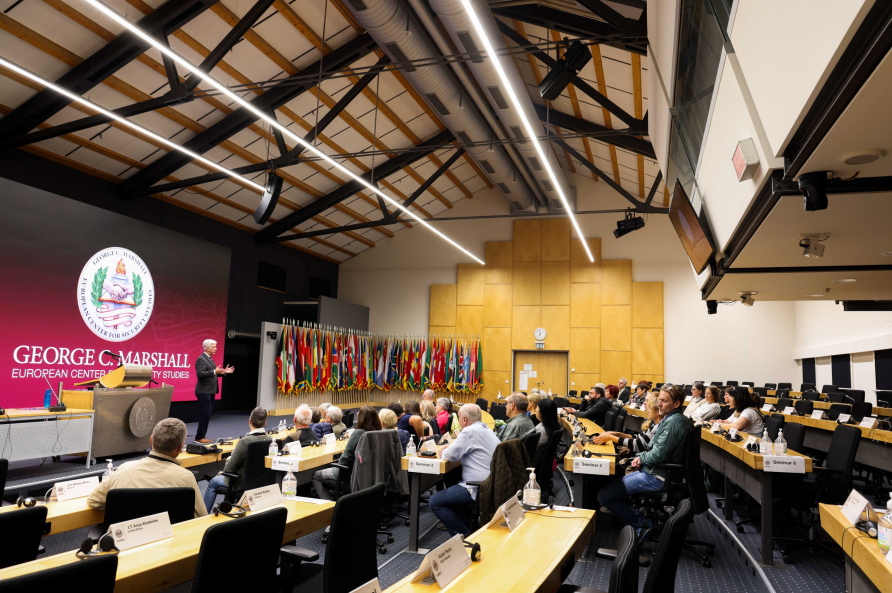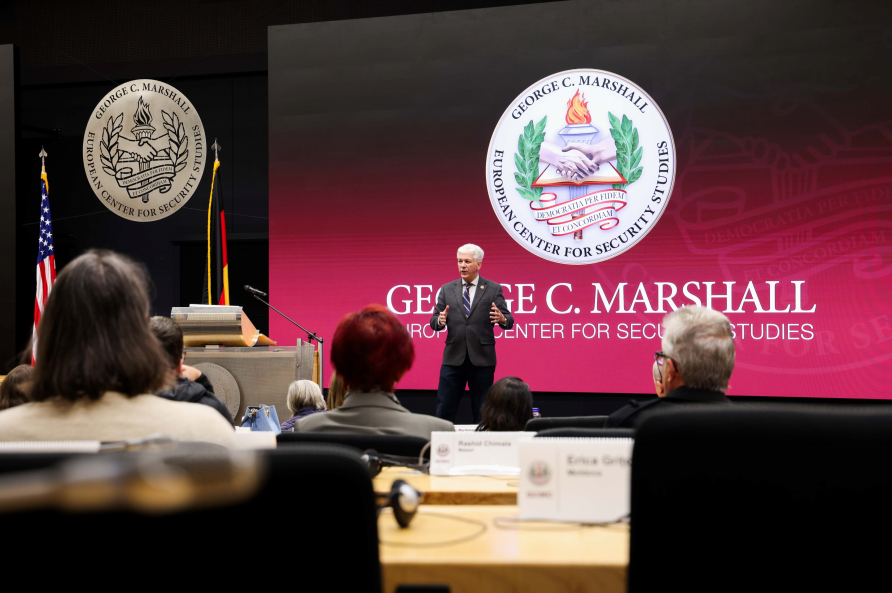
Local Residents Gather at GCMC for the Answers to: What is the Marshall Center?
GARMSICH-PARTENKIRCHEN, Germany – Since 1993, the George C. Marshall Center has operated in Southern Bavaria, just a few kilometers from the Zugspitze, Germany’s highest peak. For the staff, faculty, participants, alumni, and families connected to the Center, the mission is clear: To educate, engage, and empower security partners to collectively affect regional, transnational, and global challenges. But for many local residents, the Marshall Center’s purpose is opaque at best.
“To the Germans, the Marshall Center is a black box. There is a gate, and what happens behind the gate, nobody knows,” said Col. (Dr.) Frank Hagemann, Commander of the Marshall Center’s German Element and Deputy Dean of Research.
That ambiguity and the desire to familiarize the community with the Marshall Center was the driving force behind the latest iteration with the Garmisch-Partenkirchen Volkshochschule, or community college, and their guests, for an information session referred to as ‘bring a friend to the Marshall Center’. This event takes place twice a year as part of GCMC’s community relations initiatives.
Hagemann said that, often times, when he tells people that he works at the Marshall Center, the responses he receives are largely speculative on why it exists. “So that's [why we are holding this] … many people do not know what is located in this garrison,” he said.
In 1947, the U.S. Army established its Russia Institute in Oberammergau to provide overseas training for the Army’s Foreign Area Officers whose regional specialty would become the Soviet Union and Eastern Europe. In 1964, the institute relocated to Garmisch where future FAOs and other government officials also received additional specialized language training as part of their two-year program. The Marshall Center was established in 1993 as one of six U.S. Department of Defense Regional Centers and the only bilateral center supported by the governments of both the U.S. and Germany. An instrument of German-American cooperation, the center addresses regional and transnational security issues for the U.S. Department of Defense and German Federal Ministry of Defense and includes an international faculty and staff from over 10 partner nations.
More than 50 local residents gathered at the Marshall Center’s main plenary hall, where the center’s longest running flagship program - the Program for Applied Security Studies – is currently being held through Nov. 22. Marshall Center Director Barre Seguin welcomed the group, choosing to communicate in German before transitioning to English.
“Wilkommen, servus!” he said, thanking the community members for their attendance. Illustrating the purpose of the meeting, Director Seguin explained to the audience that the very seats they occupied were the same seats occupied during business hours by over 90 PASS participants from over 50 countries around the world. “They are here for what we call the Marshall Center experience,” he said, referring to the PASS participants, crediting a big part of that experience to their interaction with the community and the local culture.
This unique experience, which Director Seguin labeled as the center’s greatest strength, was the core topic Col. Hagemann discussed with the community members in attendance. “The U.S. Armed Forces purposely selected Garmisch,” Hagemann said. “They wanted to establish this institution here in Garmisch because they wanted to create the ‘Marshall Center experience’ in the midst of the local politeness, culture of the people, and the mountains the area had to offer.”
Colonel Hagemann proceeded with the formal portion of his presentation, explaining how the Marshall Center conducts its programs on security studies, and, in doing so, how the center is instrumental in developing global relationships that result in participants trusting one another across cultural, political, and ideological lines.
He also explained the Marshall Center’s role in hosting the Partner Language Training Center Europe, the Partnership for Peace Consortium, and the U.S. military’s Eurasian Foreign Area Officer Program. Attendees asked questions throughout the brief on topics touching on the English language curriculum, concurrent translation capabilities of the center during courses and special events, and the center’s focus on contemporary global security concerns like Russia’s war on Ukraine and the China-Taiwan issue, among others.
Sylvia Kratz, a local resident who lives and works near the Marshall Center, said she has commuted past the Marshall Center daily for the past eight years, but never quite understood what happened inside the campus. This event changed that for her.
“All that goes on now, the courses [the center] offers here and the cooperation between Germany and the U.S., I think it's quite a remarkable piece of America in Germany,” she said. “It makes me proud. It gives me a warm glow to live here even more, knowing that the U.S. has chosen this place, as well as a home, for this center.”
For more information on the George C. Marshall European Center for Security Studies, its mission, and its programs, please visit www.marshallcenter.org.


